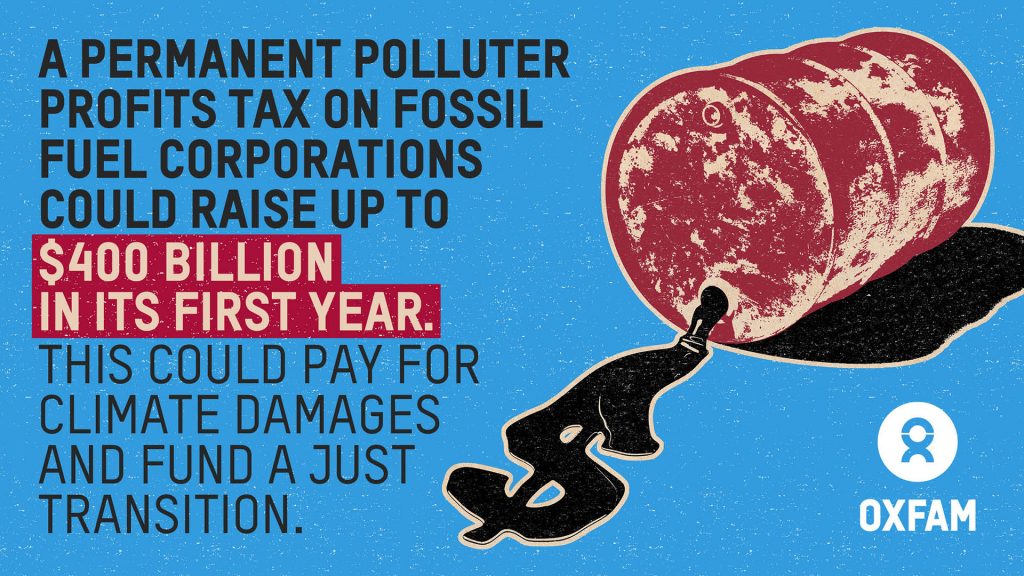Rich polluter profits tax could raise up to $400 billion and help phase out fossil fuels
Rich polluter profits tax could raise up to $400 billion and help phase out fossil fuels
Oxfam's research finds that 585 of the world's largest and most polluting fossil fuel companies made $583 billion in profits in 2024, a 68% increase since 2019.
The emissions of just 340 fossil fuel companies in 2023 accounted for over half of global emissions. Their emissions in 2023 alone are enough to cause 2.7 million heat-related deaths over the next century.
Replacing oil, gas and coal infrastructure, and helping communities protect themselves from climate change and recover from harm caused by extreme weather will cost the world trillions each year. At COP28, countries agreed to accelerate efforts to find new sources of finance, including via taxation.
Most people use fossil fuels because they lack affordable alternatives. Fossil fuel companies should have shifted years ago to renewable energy – but they have simply refused to do so. They remain motivated by profits and they will continue to keep investing in oil, coal and gas unless these are made consistently less profitable than renewable resources. And for the damage that they have already wreaked upon our climate, we should look to them first to pick up that bill.

Governments around the world must urgently impose a 'polluter profit tax' on these corporations. This is a big political lift, but we have no choice in the face of catastrophic climate harms. And we have the public on our side.
Surveys commissioned by Oxfam and Greenpeace and by others show strong public support for taxes on fossil fuel companies and the super-rich:
How this tax could work
Oxfam has modelled what such a 'rich polluter profit tax' could look like. Looking at the return on their assets for the mega-rich fossil fuel corporates, the first 3% would be taxed at a rate of 20%. Any profits above this would be deemed excessive and taxed at a rate of 50%. These taxes would only be charged on the fossil fuel segments of their businesses and on top of existing corporate taxation.
Potential Revenue
Up to $400 billion globally in its first year based on 2024 figures
Comparable to the estimated $290-$1045 billion needed annually by 2030 for loss and damage in the Global South
This type of tax would apply permanently, unlike 'windfall profit taxes' that some countries impose when a company's profits in a sector rise significantly above normal levels.
As companies shift to renewables, polluter profit tax proceeds would decline, but would be critical during the transition.
The tax should make fossil fuels less profitable than renewable energy, creating a clear incentive to shift investment flows and stop the advertising and promotion of fossil fuels.
Beyond fossil fuel corporations
Beyond fossil fuel corporations, all excess profits should be taxed, to fight inequality and build a fairer economy. The main beneficiaries of high corporate profits are the richest people who own the majority of financial assets, so excess profits mean ever higher extreme wealth inequality.
Excess Profits Tax Model:
Oxfam has modelled an excess profits tax that would apply when the return on a corporate's assets is above 10% per year; any profits above this level would be taxed at a rate of 50%.
Potential Revenue: Up to $681 billion globally per year
This model is intended to show the potential of such an excess profits tax rather than to prescribe a specific rate and design.
Revenues from these taxes should be used to fund climate action such as emissions reduction, adaptation costs and recovery from loss and damage, along with universal public services to reduce inequality. Global North countries should dedicate a significant portion of these revenues to help fund such spending in the Global South, for the same purposes.
We are facing a climate emergency, therefore governments should each impose this tax swiftly. Countries across all continents should form a 'coalition of the willing' to coordinate and speed up their efforts and counter fossil fuel company lobbying and tax avoidance. Global polluter and excess profit taxes should eventually be negotiated, agreed and formalized at the United Nations, which is currently negotiating a transformative international tax treaty.
Other taxes and regulations are also needed
Polluter and excess profit taxes can only be part of the solution. They won't fully cover the funds required for the climate transition, estimated at US$ 2.7 trillion per year between now and 2030 just for the Global South.
Additional higher taxes are required, for example, on super-rich individuals and on other polluting investors and companies.
We also need systemic global reform to prevent tax evasion and aggressive tax avoidance and to ensure the Global South gets a fair share of tax revenues from multinationals. UN negotiations for a global tax convention must achieve this to fight inequality both between and within countries.
We must bridge the gap between what the people want and what their leaders are doing. Let's get to work!

